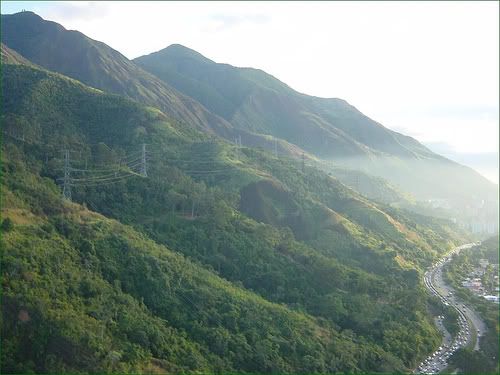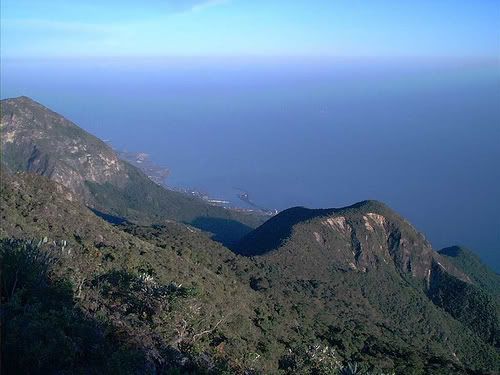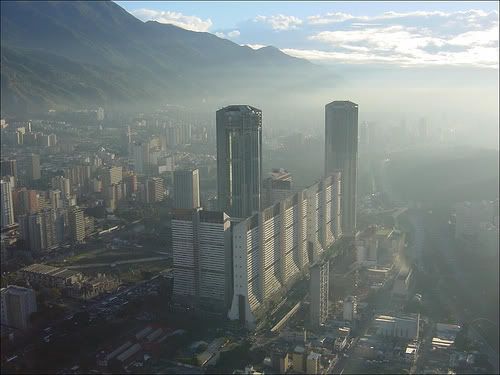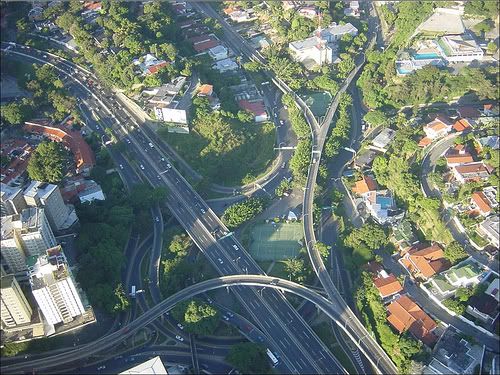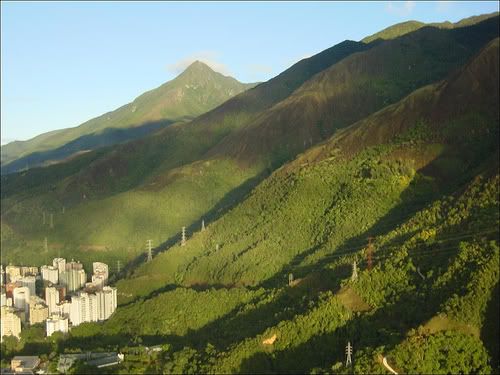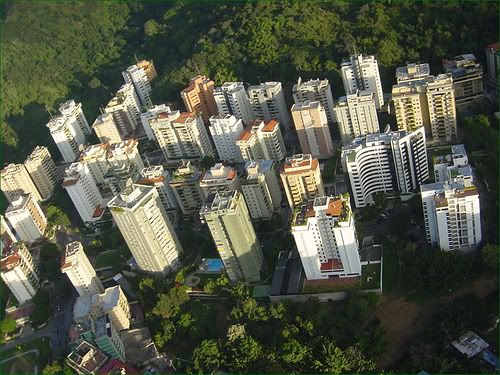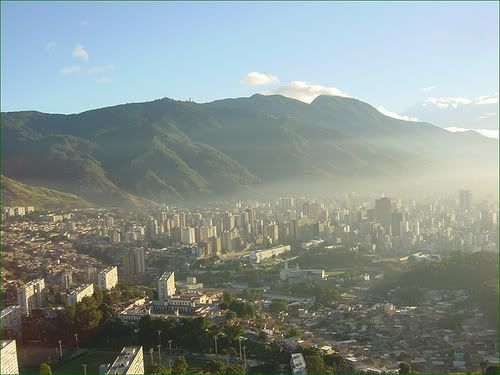Saturday, December 23, 2006
Caracas beckons
At least they look nice
As people know, I have never been a fan of Venezuela spending precious money on expensive new fighter jets. But they did. Looking at the pictures all I can say is at least they look nice. Hopefully, Venezuelans will get to see them perform at plenty of air shows. I do have to wonder if the camaflouge scheme is the most appropriate one for a tropical country though.
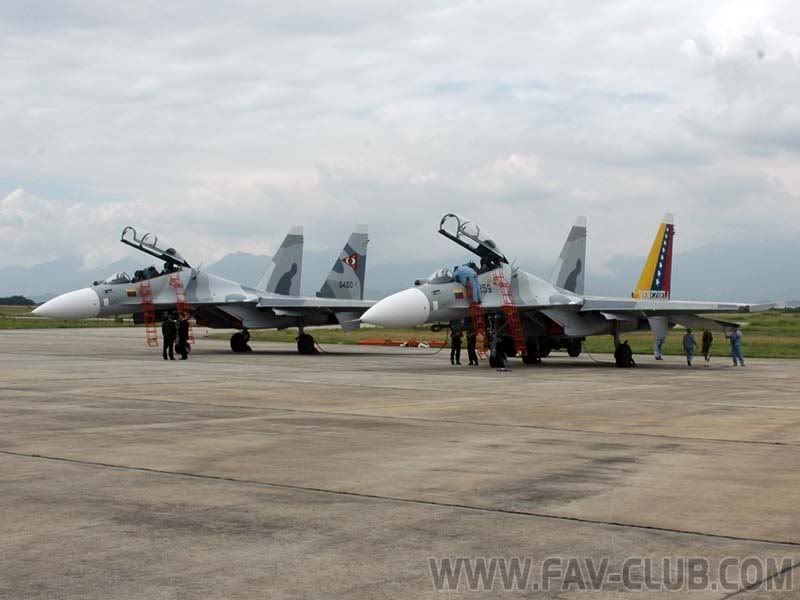
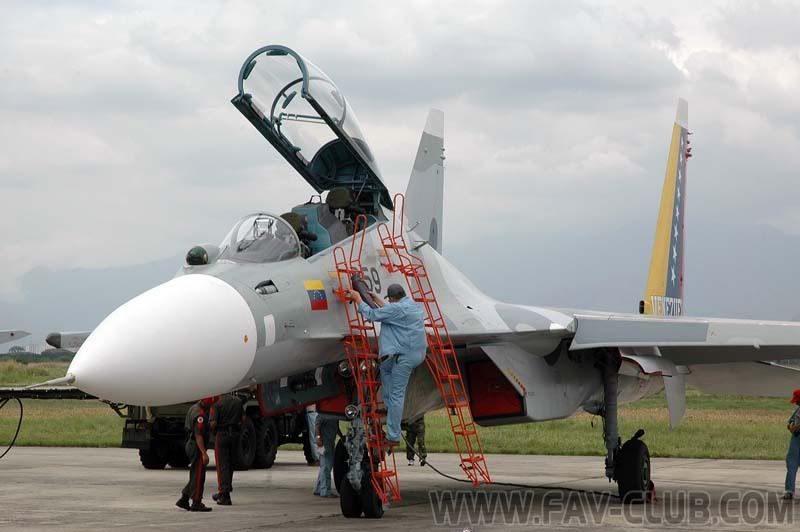
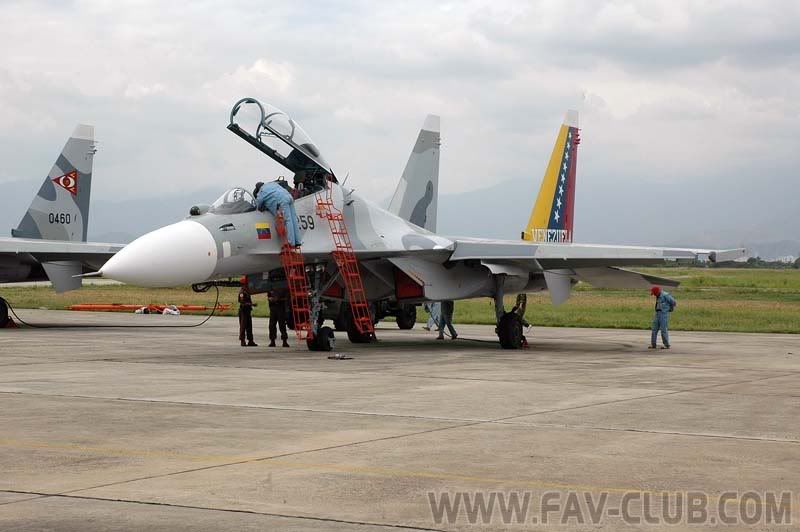
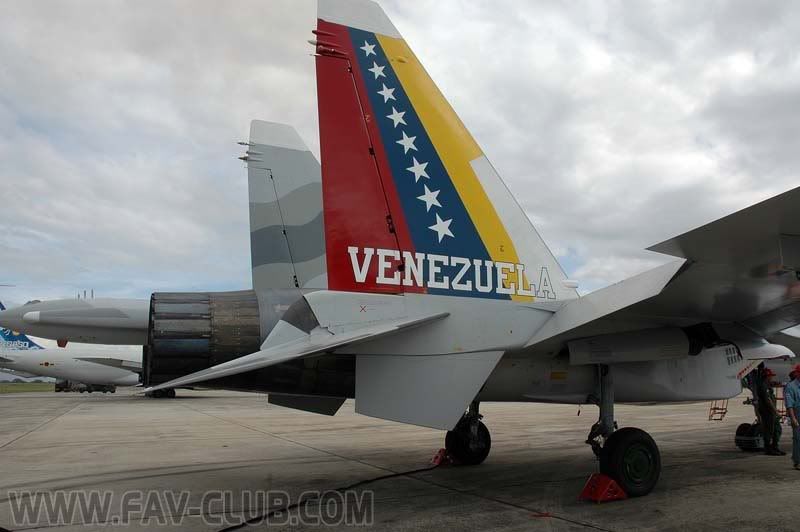
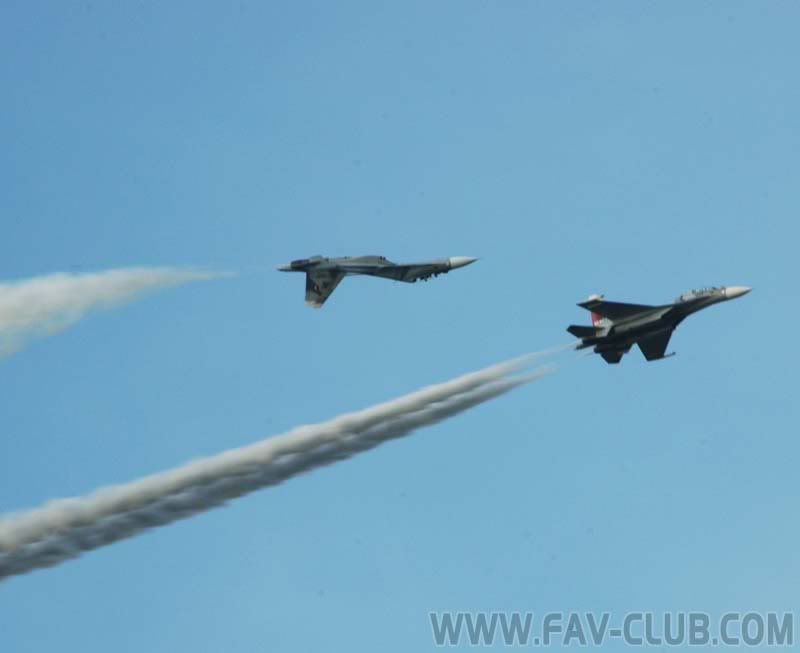
|





|
The last stand of the fools
On December 3rd Hugo Chavez won a decisive victory of the his opponent in Venezuela’s presidential election. In fact, Chavez received the largest percentage of the vote ever in Venezuela’s democratic era.
Given the fact that it was a clean and audited vote, and that the international observers saw that it was a clean vote, his opponent Manuel Rosales, did the honorable thing and conceded. In fact, the Venezuelan opposition took a big step forward by recognizing the outcome of the election and vowing to continue forward working within the democratic system.
Of course, there are always going to be some holdouts (dead-enders as some people would refer to them) and this case is no exception. And it should come as no surprise that two of them are Wall Street Journal Op-Ed writer Mary Anastasia O’Grady, and Gustavo Coronel.
How could they possibly impugn the legitimacy of Chavez’s mandate you ask? Lets have a look from last O’Grady’s Op-Ed piece from last week:
Really, not a shred? An open and contested elections count for nothing? Freedom of speech and freedom to organize count for nothing? An opponent who has the backing of the great majority of the private media doesn’t signify anything?
Already it is clear, this should be interesting!
For those wanting to read the whole sad spectacle of Mr. Coronel’s “report” it can be found here. In it he spouts all sort of absurd accusations with no substantiation. In fact, do read the end notes – the source for his accusations often turns out mainly his other articles posted on various opposition internet sites. Some times he does have other sources though – such as the “MilitaresDemocraticos” web site, and the owner of the BBO Financial Services firm, a one Miguel Octavio!! Try not to hurt yourself laughing
Here, Coronel/O’Grady claim that the Chavez government has been illegitimate since the beginning due to the way it modified the constitution. Of course, nothing could be further from the truth. Every “I” was dotted and “t” crossed in making the changes legitimate. The Supreme Court of the time, which was not named by Chavez and was generally opposed to him, ruled that a referendum to create a constituent assembly for purposes of changing the constitution and government was completely legitimate.
The referendum posed the following question:
“Should a National Constituent Assembly be convoked with the purpose of transforming the State and creating a new legal order that will permit the effective functioning of a Social and Parcticipative Democracy?”
This referendum passed overwhelmingly and the rest is history. Clearly it was completely legal and legitimate as it had the blessing of both the existing Supreme Court and the Venezuelan people.
This is where the BS starts coming fast and furious. Coronel never once tells us what makes up that $17 billion – he simply refers us to the “Center for Economic Research” where there is no breakdown of it either. On the billions that have supposedly disappeared abroad his source is an interview in Veneconomy (expensive subscription site which therefore can’t be accessed) which opposition “economists” Asdrubal Ontiveros and Jose Gurra, the latter famous for accusation of huge fraud at PDVSA which turned out to be completely false.
What is funny here is that he references Transparency International as if it were some objective and independent outside source, when it fact HE was its representative in Venezuela for years (he now lives in Virginia so I guess he had to give that gig up)
Things get even better here. First he say the CNE hasn’t allowed any independent audit of the electoral roles. This is a straight out lie as CAPEL audited them a year ago and found them to be acceptable for use in elections.
In fact, when some opposition University Rectors examined the voting rolls they didn’t find any political bias or errors that would favor one side or the other.
The Coronel comes with the howler that it is “a statistical improbability” that 17 million people can be registered to vote when there are only 26 million Venezuelans and according to Coronel 60% are too young to vote. First, this is not a typo, the moron really did say that, it is on page 12 of his Cato report. Yet when you look up the actual numbers you find that more than 70% of the population is over 15 which means it is probably around 60% which is over eighteen and can therefore register to vote, not 60% being too young to register as Coronel in his ignorance asserts.
Also, the assertion that PDVSA is lacking in transparency is also false as its audited financial statements are here to be read.
It is interesting that O’Grady, of all people, would bitch about Venezuela being a potential transshipment place for drugs bound for the U.S. She herself knows making drugs illegal simply corrupts governments and police forces throughout the world when the real problem is people in the U.S. consuming these drugs. [As an aside, I’ve often wondered by what right the U.S. complains about other countries not controlling their borders and letting drugs pass through. At some point all the drugs cross the U.S. border. If the U.S. with all its technology and resources can’t control its own border how can it expect poor countries to control their borders? Typical gringo hypocracy IMHO]
Ok, here I am cornered. The fact that Venezuela would plan a joint venture with Iran to produce cars sure is compelling evidence democracy doesn’t exist in Venezuela. I knew democracy had gone down the tubes in the U.S. when Walmarts started filling up with toys made in communist China.
Unfortunately Ms. O’Grady’s rant didn’t really teach us anything about the state of democracy in Venezuela. But it did teach us that she and Coronel are fools, by any definition. And liars to boot. Then again, we already knew that.
|
Given the fact that it was a clean and audited vote, and that the international observers saw that it was a clean vote, his opponent Manuel Rosales, did the honorable thing and conceded. In fact, the Venezuelan opposition took a big step forward by recognizing the outcome of the election and vowing to continue forward working within the democratic system.
Of course, there are always going to be some holdouts (dead-enders as some people would refer to them) and this case is no exception. And it should come as no surprise that two of them are Wall Street Journal Op-Ed writer Mary Anastasia O’Grady, and Gustavo Coronel.
How could they possibly impugn the legitimacy of Chavez’s mandate you ask? Lets have a look from last O’Grady’s Op-Ed piece from last week:
Defining Democracy Down
By MARY ANASTASIA O'GRADY
15 DEC 2006 Over the course of five days in Caracas last week, I couldn't help but notice the ubiquitous image of President Hugo Chávez peering down from hundreds of his campaign banners that read "Vote against the devil; vote against the empire." The nationalistic message denouncing President George W. Bush and the U.S. blanketed the capital.
On election night, as it became clear that more votes had been cast for Mr. Chávez than for candidate Manuel Rosales, the president appeared on the balcony of Miraflores, the presidential palace, to proclaim that "the devil who tries to dominate the world," had suffered another defeat.
The red-clad Chávez dramatically recited from the Lord's Prayer and then borrowed from it for his own prophesy. "Thy kingdom come," he bellowed, and thereafter, "the kingdom of socialism." The ailing Fidel Castro reportedly sent a short message from Havana congratulating Mr. Chávez and noting that "the victory was resounding, crushing and without parallel in the history of our America."
Mr. Chávez has for eight years been heading a devoutly anti-American government and he is widely considered the region's heir apparent to Fidel. But be prepared for the Venezuelan bad boy to become even more menacing to the U.S. now. The reason, in a word, is "legitimacy." Having gone through an electoral exercise against candidate Rosales, who managed to garner nearly 40% of the vote, Mr. Chávez is likely to be emboldened by the conventional notion around the region that he heads a "democracy."
This is regrettable. There isn't a shred of evidence to support the claim that Venezuela has a democracy and voices for freedom are badly needed to point out this reality.
Really, not a shred? An open and contested elections count for nothing? Freedom of speech and freedom to organize count for nothing? An opponent who has the backing of the great majority of the private media doesn’t signify anything?
Already it is clear, this should be interesting!
The assault on Venezuelan democracy, which began before Mr. Chávez came to power, has been possible largely because of state corruption. But the Chávez government has taken the concept to a whole new level. In this space last week I cited a report by Gustavo Coronel, a former director of the state oil company. His paper, "Corruption, Mismanagement and Abuse of Power in Hugo Chávez's Venezuela," published by the Cato Institute, deserves a fuller airing.
Mr. Coronel, who was the Venezuelan representative for Transparency International from 1996-2000, has painstakingly traced the "hypercorruption" that is now flourishing as a result of record oil income, poor management, and the "ideological predilections" of a president trying to "play a messianic role in world affairs." In 23 pages he neatly shows that Mr. Chávez, who claims to represent the progressive left, is nothing but an old-fashioned authoritarian otherwise known in Latin America as a caudillo.
For those wanting to read the whole sad spectacle of Mr. Coronel’s “report” it can be found here. In it he spouts all sort of absurd accusations with no substantiation. In fact, do read the end notes – the source for his accusations often turns out mainly his other articles posted on various opposition internet sites. Some times he does have other sources though – such as the “MilitaresDemocraticos” web site, and the owner of the BBO Financial Services firm, a one Miguel Octavio!! Try not to hurt yourself laughing
The report properly notes that government corruption is "the violation of public interest for personal or partisan gain," a definition that goes beyond graft to "the use and abuse of political power." Chávez corruption includes the 1999 constituent assembly, which was packed with his supporters and given supraconstitutional powers to dissolve the country's democratic institutions and create new ones made up of pro-Chávez actors. "This ended with all Venezuelan political institutions under the control of the government and eliminated effective checks and balances," Mr. Coronel writes. "From that moment on . . . Venezuela ceased to be a democracy."
Here, Coronel/O’Grady claim that the Chavez government has been illegitimate since the beginning due to the way it modified the constitution. Of course, nothing could be further from the truth. Every “I” was dotted and “t” crossed in making the changes legitimate. The Supreme Court of the time, which was not named by Chavez and was generally opposed to him, ruled that a referendum to create a constituent assembly for purposes of changing the constitution and government was completely legitimate.
The referendum posed the following question:
“Should a National Constituent Assembly be convoked with the purpose of transforming the State and creating a new legal order that will permit the effective functioning of a Social and Parcticipative Democracy?”
This referendum passed overwhelmingly and the rest is history. Clearly it was completely legal and legitimate as it had the blessing of both the existing Supreme Court and the Venezuelan people.
Since then the government has used its unchecked power to "spend" the country's oil wealth arbitrarily and without any accountability. Using the data from the Center for Economic Research in Caracas, Mr. Coronel identifies $17 billion in Venezuelan "donations to politically friendly countries," various infrastructure projects around the region and weapons purchases. Bolivian President Evo Morales, who famously used street violence to bring down two elected governments, got $30 million on a visit to Caracas in January. "According to the Venezuelan Central Bank," Mr. Coronel writes, "about $22.5 billion has been transferred to accounts abroad by the Chávez government since 2004." Some $12 billion of it, he says, remains unaccounted for.
This is where the BS starts coming fast and furious. Coronel never once tells us what makes up that $17 billion – he simply refers us to the “Center for Economic Research” where there is no breakdown of it either. On the billions that have supposedly disappeared abroad his source is an interview in Veneconomy (expensive subscription site which therefore can’t be accessed) which opposition “economists” Asdrubal Ontiveros and Jose Gurra, the latter famous for accusation of huge fraud at PDVSA which turned out to be completely false.
Mr. Coronel notes that "according to Transparency International 95% of all known public contracts are awarded without bidding." In a country where the state owns the oil and the oil is the economy this means massive politicized fraud. False invoicing and the signing of contracts with "nonexistent suppliers" are among the tricks of the trade and explain why the country is witnessing the "emergence of a new rich 'revolutionary' class."
What is funny here is that he references Transparency International as if it were some objective and independent outside source, when it fact HE was its representative in Venezuela for years (he now lives in Virginia so I guess he had to give that gig up)
The politicized Supreme Court, National Electoral Council (CNE) and state-owned oil company PdVSA no longer have any transparency obligations. The CNE, for example, has not allowed an independent audit of the voter registry, which contains almost 17 million names, "a statistical improbabilty" in a country of 26 million, "60% of whom are too young to register." With Chávez carte blanche comes power to destroy political enemies too. After a PdVSA strike to oppose the politicization of the oil company 20,000 skilled employees were fired in violation of Venezuelan labor laws.
Things get even better here. First he say the CNE hasn’t allowed any independent audit of the electoral roles. This is a straight out lie as CAPEL audited them a year ago and found them to be acceptable for use in elections.
In fact, when some opposition University Rectors examined the voting rolls they didn’t find any political bias or errors that would favor one side or the other.
The Coronel comes with the howler that it is “a statistical improbability” that 17 million people can be registered to vote when there are only 26 million Venezuelans and according to Coronel 60% are too young to vote. First, this is not a typo, the moron really did say that, it is on page 12 of his Cato report. Yet when you look up the actual numbers you find that more than 70% of the population is over 15 which means it is probably around 60% which is over eighteen and can therefore register to vote, not 60% being too young to register as Coronel in his ignorance asserts.
Also, the assertion that PDVSA is lacking in transparency is also false as its audited financial statements are here to be read.
Drug trafficking through Venezuela has also boomed under the Chávez government and there is good reason to believe the military is involved. A May report for Jane's Intelligence Review by Andy Webb-Vidal contains an interview with a former Colombian guerrilla who knows how to get illegal substances into Venezuela: "Once across the river, the [Colombian rebels] would make a payment to the National Guard and then transport the drugs in four-wheel drive vehicles."
It is interesting that O’Grady, of all people, would bitch about Venezuela being a potential transshipment place for drugs bound for the U.S. She herself knows making drugs illegal simply corrupts governments and police forces throughout the world when the real problem is people in the U.S. consuming these drugs. [As an aside, I’ve often wondered by what right the U.S. complains about other countries not controlling their borders and letting drugs pass through. At some point all the drugs cross the U.S. border. If the U.S. with all its technology and resources can’t control its own border how can it expect poor countries to control their borders? Typical gringo hypocracy IMHO]
Just days after the election, Mr. Chávez took off on a South American tour to exert his regional leadership as a man chosen by the people. His aircraft was escorted by the first two of 30 Russian-made warplanes that Venezuela has recently ordered. Back home his government had just announced a joint venture with Iran to make cars in Venezuela.
Ok, here I am cornered. The fact that Venezuela would plan a joint venture with Iran to produce cars sure is compelling evidence democracy doesn’t exist in Venezuela. I knew democracy had gone down the tubes in the U.S. when Walmarts started filling up with toys made in communist China.
Venezuela is not a democracy by any definition and Mr. Chávez is sure to be a thorn in the side of democrats for years to come. But legitimizing his abuse of power, in face of all the evidence, only makes things worse.
Unfortunately Ms. O’Grady’s rant didn’t really teach us anything about the state of democracy in Venezuela. But it did teach us that she and Coronel are fools, by any definition. And liars to boot. Then again, we already knew that.
|
Wednesday, December 20, 2006
This is what an over-valued currency does to you.
The Venezuelan national currency, the Bolivar, has been increasing sharply in value relative to other currencies for some time. This is so because inflation inside Venezuela has been in the double digits, yet the exchange rate (the number of Bolivars it takes to buy a dollar or euro) has remained unchanged. So while a Bolivar buys 15% less of goods and services in Venezuela it still buys you the same number of dollars because the exchange rate has been stuck at 2,150 Bs. to the dollar.
This makes imported goods cheaper for Venezuelans than the goods they themselves make in their own country. The result is few other countries will want to buy goods made in Venezuela because they will be comparatively expensive while Venezuelans will happily buy goods from abroad because they cost less.
Maybe this all sounds like mumbo jumbo economics but today in Ultimas Noticias there was a little article that showed the reality of this is a big way. The article pointed out that although the economy has been booming, essentially growing at 10% for the past three years, agricultural production is down in Venezuela 8% this year. This chart shows how production has dropped for various crops:
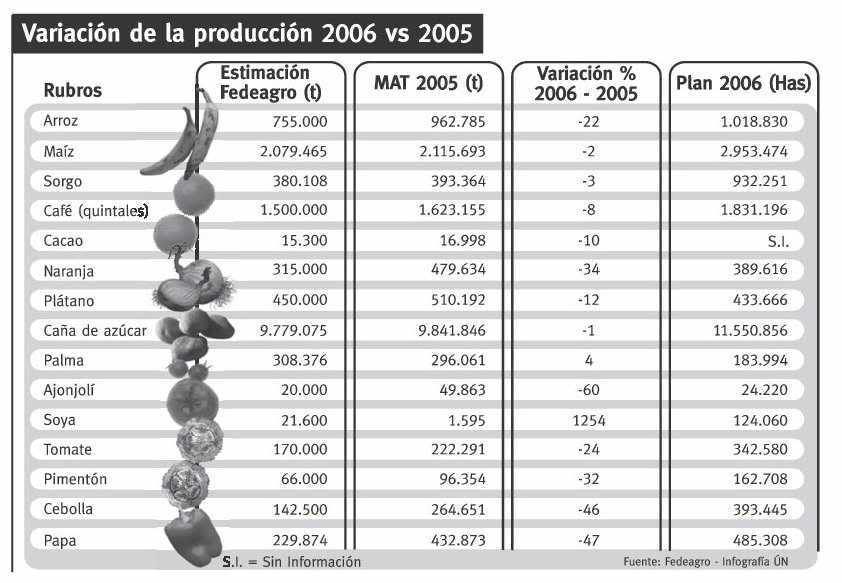
You can see what is happening with some major crops - rice is down 22%, corn is down 2%, coffee is down 8%, oranges are down 34%, and plantains are down 12%. The only things to have gone up are soy (yuck!) and oninions. Are Venezuelans eating less? Absolutely not, they are eating more. It is just that the food is being imported instead of being grown domestically.
Who would have guessed that a nationalistic government which has built tractor factories, expropriated unused land, and talked endlessly about "internal" development would by presiding over such a decline?
But it is. Not because it doesn't care nor because all of those policies just mentioned are failures. Rather, it is pursueing economic policies that, unintentionally, undo a lot of other good work. Letting their currency become so overvalued is one such policy. As long as Venezuela has a market economy, and regardless of how much "21st Century Socialism" is talked about it still does, it must pay attention to the fundementals of economics. It isn't all mumbo-jumbo, just look at where the food is coming from.
|
This makes imported goods cheaper for Venezuelans than the goods they themselves make in their own country. The result is few other countries will want to buy goods made in Venezuela because they will be comparatively expensive while Venezuelans will happily buy goods from abroad because they cost less.
Maybe this all sounds like mumbo jumbo economics but today in Ultimas Noticias there was a little article that showed the reality of this is a big way. The article pointed out that although the economy has been booming, essentially growing at 10% for the past three years, agricultural production is down in Venezuela 8% this year. This chart shows how production has dropped for various crops:

You can see what is happening with some major crops - rice is down 22%, corn is down 2%, coffee is down 8%, oranges are down 34%, and plantains are down 12%. The only things to have gone up are soy (yuck!) and oninions. Are Venezuelans eating less? Absolutely not, they are eating more. It is just that the food is being imported instead of being grown domestically.
Who would have guessed that a nationalistic government which has built tractor factories, expropriated unused land, and talked endlessly about "internal" development would by presiding over such a decline?
But it is. Not because it doesn't care nor because all of those policies just mentioned are failures. Rather, it is pursueing economic policies that, unintentionally, undo a lot of other good work. Letting their currency become so overvalued is one such policy. As long as Venezuela has a market economy, and regardless of how much "21st Century Socialism" is talked about it still does, it must pay attention to the fundementals of economics. It isn't all mumbo-jumbo, just look at where the food is coming from.
|
Monday, December 18, 2006
No creo en unicos
My apoligies in advance to those who don't read Spanish but I ran across this very good, but too long to translate right now, article on Chavez's idea of creating a single party. The author, a long time pro-Chavez Venezuelan blogger, expresses skepticism over Chavez's idea of setting up a single party:
Please do check out the full article and comments at the blog. The Luigino who runs the Lubrio blog and is of Aporrea fame, also chimes in with concern over this.
Yet he said something that many of us can agree with, even those of us who are skeptical of this move. Chavez is going to do it, and he certainly has earned the right to do it. More importantly if there is anything this blogger has learned over the past eight years it is to not second guess Chavez. The man truly does know what he is doing. I can think of any number of situations where I thought what he was doing was either wrong or simply made no sense, yet time and again they, with time, proved to be brilliant moves. So we owe it to him to wait and see what comes of it before becoming too skeptical. So as Luigino says; bueno, veremos qué pasa.
|
Antes que nada comparto toooodo lo dicho por el presidente Chávez en el acto de reconocimiento a la base que trabajo (bárbaramente) para la reelección del presidente, pasando por encima de la burocracia estupida creada intencionalmente por jalamecates y negociantes de oficio.
El MVR, el PPT entre otros se convirtieron en tutores malintencionados de la gente que sigue al presidente, es mas se han convertido en alcabalas matraqueadoras de la voluntad de la base, todos lamentablemente nombrados “digitalmente” por el mismo presidente, cosa que siempre he criticado de frente y que ha derivado en errores garrafales como candidatear a levantamanos en la Asamblea o Alcaldes piratas o gobernadores que se las echan al hombro.
Entiendo el malestar del presidente cuando dice que en verdad esos votos alcanzados el 3D no son de sigla alguna, son del pueblo mismo…es mas yo le agregaría que no son de gestiones locales-regionales algunas (contados casos), son de la gente.
Pero eso justifica la creación de un partido? es ahí cuando digo que no comparto eso….la cosa no es de crear o construir partidos, eso es cambiar de siglas nada mas, pero no cambiar mas alla de militar de uno a otro partido.
Yo no estaría en ese partido si se repite la decisión digital de poner a un Ameliach, a un Cabello, a un bolsa como Castelar, a lideres de papel en la “dirección” de un movimiento que solo lideriza Chavez y los demás andan viendo como se montan en dicho autobús, me parece genial que ese caso Chávez le de la espalda a esta gente que quiere cobrar algo que no han hecho.
Pero para que uds entiendan porque no creo en partidos únicos (sino en la diversidad que va mas allá de siglas o colores) les dejo lo escrito por el Profesor Rigoberto Lanz hace unos meses…..disculpen el copy/paste
Please do check out the full article and comments at the blog. The Luigino who runs the Lubrio blog and is of Aporrea fame, also chimes in with concern over this.
Yet he said something that many of us can agree with, even those of us who are skeptical of this move. Chavez is going to do it, and he certainly has earned the right to do it. More importantly if there is anything this blogger has learned over the past eight years it is to not second guess Chavez. The man truly does know what he is doing. I can think of any number of situations where I thought what he was doing was either wrong or simply made no sense, yet time and again they, with time, proved to be brilliant moves. So we owe it to him to wait and see what comes of it before becoming too skeptical. So as Luigino says; bueno, veremos qué pasa.
|
Guys, it's over
The election happened more than two weeks ago. But you could be forgiven if from reading Ultimas Noticias you thought it was coming up this weekend. Here is a sample of recent advertisements from today's edition of U.N,:
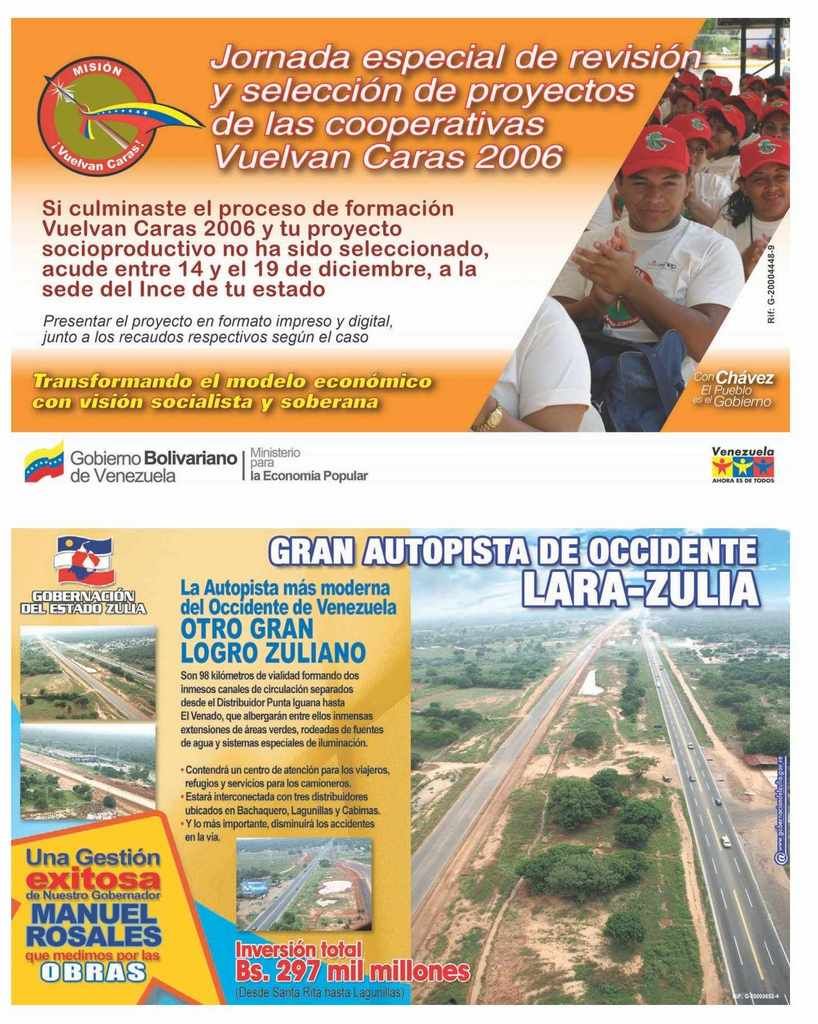
I am sure the advertising department of Ultimas Noticias is happy with this. But there is any good reason why the state government of Zulia and the national government should be wasting money on an election long since decided?
|

I am sure the advertising department of Ultimas Noticias is happy with this. But there is any good reason why the state government of Zulia and the national government should be wasting money on an election long since decided?
|
Sunday, December 17, 2006
Partido Socialista Unido de Venezuela
Yesterday Chavez announced the creation of a single party for the forces of "Chavismo". Here is a video of the speech:
It is far to long to translate but here are some key points that he made:
It will be interesting to see where this all goes. But I can tell you there will be at least one very happy group of people - the National Electoral Council, or CNE. Look at all the pro-Chavez parties they had to put on the ballots:
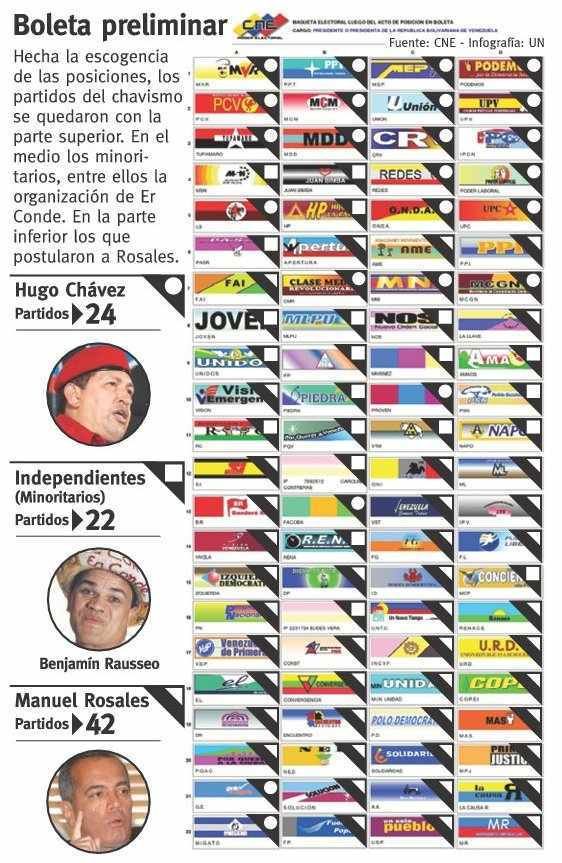
There were 24 pro-Chavez parties on the ballot in the recent election. That is simply absurd. Now there will be one, with maybe a few more that decide not to merge and continue along on their own but still remain pro-Chavez.
And of course, the opposition can continue with its absurd 64 parties. Actually, their number of parties seems to be growing much more rapidly than their number of supporters. If that keeps up they may wind up with more parties than supporters. But given that they can't win an election to save their lives I doubt that anyone cares, except the poor CNE workers who have to put all their stupid little symbols on the ballot.
|
It is far to long to translate but here are some key points that he made:
The key task before Venezuela is creating socialism. But there is no existing model for this socialism and no plan to guide its creation. So it will be constructed as they go along and it will be built from the bottom up, not from the top down. Also, it will be made by Venezuelans in accordance with the condition in Venezuela.
As socialism is a long term project the more immediate task is creating a single political party not the current lettered soup of parties. Parties that do not want to participate in the formation of this new party are completely free to go their own way. But they will have to leave the government. The seven million votes were not votes for individual parties, they were votes for Chavez.
There were 32,000 electoral workers in the campaign for the December 3rd vote. They will be the basis of the new party.
The name of the new party is the United Socialist Party of Venezuela. The name is not yet a definitive one.
It will be interesting to see where this all goes. But I can tell you there will be at least one very happy group of people - the National Electoral Council, or CNE. Look at all the pro-Chavez parties they had to put on the ballots:

There were 24 pro-Chavez parties on the ballot in the recent election. That is simply absurd. Now there will be one, with maybe a few more that decide not to merge and continue along on their own but still remain pro-Chavez.
And of course, the opposition can continue with its absurd 64 parties. Actually, their number of parties seems to be growing much more rapidly than their number of supporters. If that keeps up they may wind up with more parties than supporters. But given that they can't win an election to save their lives I doubt that anyone cares, except the poor CNE workers who have to put all their stupid little symbols on the ballot.
|
How to screw Iraqis and workers in the U.S. at the same time.
I thought this article from the Financial Times pretty well summed up whose side the powers that be are on, both in places like Iraq and in places like Kansas:
Whenever a strike is likely to lose by the workers all being replaced by scabs and just losing the jobs the government is perfectly willing to let the "private dispute" run its course. But whenever the workers hold a strong hand and might emerge victorious the government winds up intervening and forcing people back to work for the "public good", or, as in this case, to support the war effort. So this seems about par for the course.
BTW, not to rub it in too much, but this blogger has been on a quite a roll as of late with predictions. First, I got the Venezuelan election outcome exactly right, picking at 62% to 38% Chavez win. Now it looks just as clear that the U.S. is about to start seriously ramping up its military forces in Iraq as they get more desperate in their efforts to win the war. Not that I'm happy about this last prediction coming true, I'm not. But it was pretty obvious that it was going to happen.
The forces of imperialism aren't going to give in easily. And even if they ultimately leave in defeat, which they almost certainly will, they will want to make sure they have completely laid waste to Iraq as a "lesson". Rumsfeld was right when he said there were a lot of "dead enders" in Iraq. He just failed to mention that the "dead enders" wear U.S. military uniforms. And of course, Bush, Cheney, and Rice are all "dead enders" too. It's especially easy for them to wind up that way when it is not them, their friends, nor their relatives who are winding up dead as the result of all this.
|
US Army might break Goodyear strike
By Bernard Simon in Toronto
Published: December 15 2006 18:45 Last updated: December 15 2006 18:45
The US Army is considering measures to force striking workers back to their jobs at a Goodyear Tire & Rubber plant in Kansas in the face of a looming shortage of tyres for Humvee trucks and other military equipment used in Iraq and Afghanistan.
A strike involving 17,000 members of the United Steelworkers union has crippled 16 Goodyear plants in the US and Canada since October 5.
The main issues in the dispute are the company's plans to close a unionised plant in Texas, and a proposal for workers to shoulder future increases in healthcare costs.
.....................................
According to Duncan Hunter, chairman of the House of Representatives armed services committee, the strike has cut output of Humvee tyres by about 35 per cent.
Mr. Hunter said the army was exploring a possible injunction under the Taft-Hartley Act to force the 200 Kansas workers back to their jobs.
Whenever a strike is likely to lose by the workers all being replaced by scabs and just losing the jobs the government is perfectly willing to let the "private dispute" run its course. But whenever the workers hold a strong hand and might emerge victorious the government winds up intervening and forcing people back to work for the "public good", or, as in this case, to support the war effort. So this seems about par for the course.
BTW, not to rub it in too much, but this blogger has been on a quite a roll as of late with predictions. First, I got the Venezuelan election outcome exactly right, picking at 62% to 38% Chavez win. Now it looks just as clear that the U.S. is about to start seriously ramping up its military forces in Iraq as they get more desperate in their efforts to win the war. Not that I'm happy about this last prediction coming true, I'm not. But it was pretty obvious that it was going to happen.
The forces of imperialism aren't going to give in easily. And even if they ultimately leave in defeat, which they almost certainly will, they will want to make sure they have completely laid waste to Iraq as a "lesson". Rumsfeld was right when he said there were a lot of "dead enders" in Iraq. He just failed to mention that the "dead enders" wear U.S. military uniforms. And of course, Bush, Cheney, and Rice are all "dead enders" too. It's especially easy for them to wind up that way when it is not them, their friends, nor their relatives who are winding up dead as the result of all this.
|
The bridges keep coming
The other day it was announced that the new viaduct linking Caracas with the coast is now 57% complete. Five of the seven support towers have now been completed and the steel spans between the towers are progressing as can be seen from this picture:
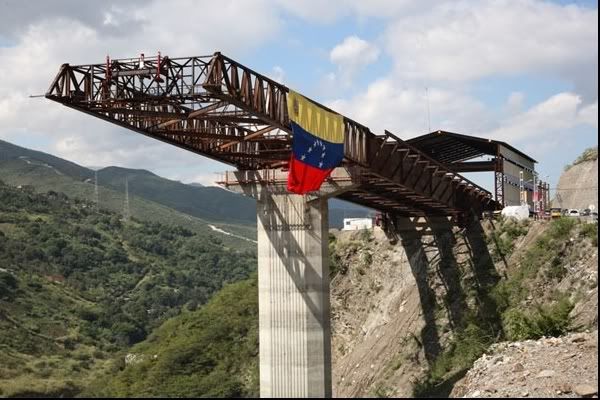
The interesting thing about how this is being built is that the steel spans are constructed on the southern side of the span and then are progressively pushed further our over the support towers. In other words, the beginning of the steel span which you see in the photo started on the Caracas side of the span but will ultimately wind up on the Vargas side of the viaduct. Pretty cool. I guess they do it that way because putting up big cranes all along the length of the bridge would be too much work and/or more costly.
On a related matter the government has also annonounced that it will build a new route down to the see from Caracas. From the following map you can see that it actually parallels the current route but then vears off through the mountains and has LOTS of bridges and tunnels.
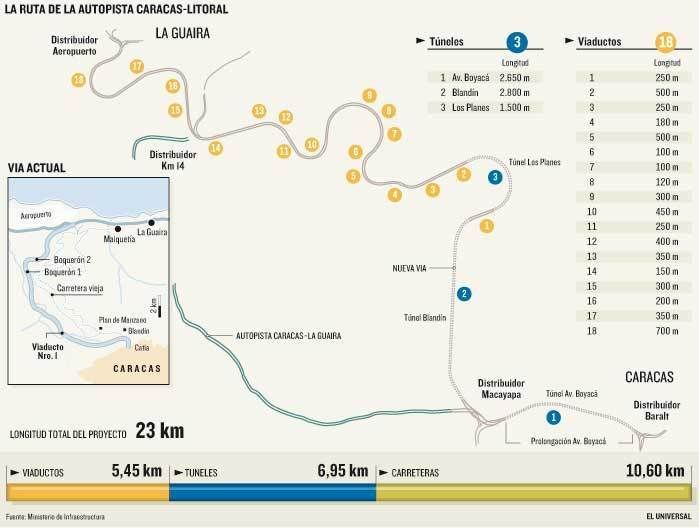
I'm not exactly sure why they are doing this. The existing route is capable of handling the amount of traffic it has. I also know that building a rail link between Caracas and the sea has been mentioned. I think it would be a good idea to do that before building another expensive, and not clearly needed, road link.
UPDATE:
Since the subject of Caracas traffic and mass transit has come up in the comments I might as well do an update on the Caracas subway system which I've been meaning to do but haven't gotten around to.
First, here is a map from some time ago of what the Caracas subway is supposed to look like once it is fully completed:
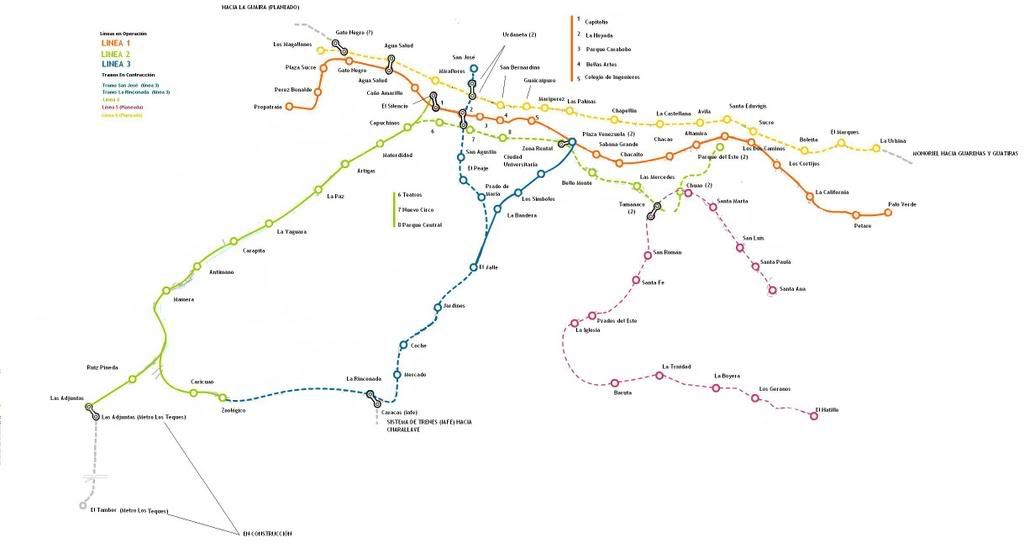
Note the lines that are solid denote existing lines. The dashed lines are lines under construction or planned but not yet under construction. The main line is the orange number 1 line which goes from left to right across the middle of the map. It is far an away the most heavily used line, given that Caracas is in a valley that runds east to west, and is VERY overcrowded. The green line running south off the west end is the number 2 line and is heavily used but not overcrowded. The blue line running south in the middle is the number three line and note part of it is still under construction. It has been finished all the way to Rinconada as of a couple of months ago but not all the intermediate stations have yet been completed. There is also another planned line running south, in purple on the map, which is planned but not yet even under construction.
Due to overcrowding on the number 1 line the subway DESPERATELY needs parallel east-west lines to be built. Note there is a green dashed line running right beneath the number 1 line. The part on the left, from Capuchinos to Zona Rental, was opened a few months ago. The part to the right (east) of Zona Rental has now begun construction. Please note, this used to all be called the number 4 line but that has now changed.
Note this map shows one very interesting feature that I had never seen before, a yellow line running east-west due north of the number one line. If both the number 4 line and the yellow number 6 line are built that will be a BIG help.
Now, construction of the green line, from Zona Rental to Parque del Este was begun last month. Of course, Chavez showed up and place a plaque:
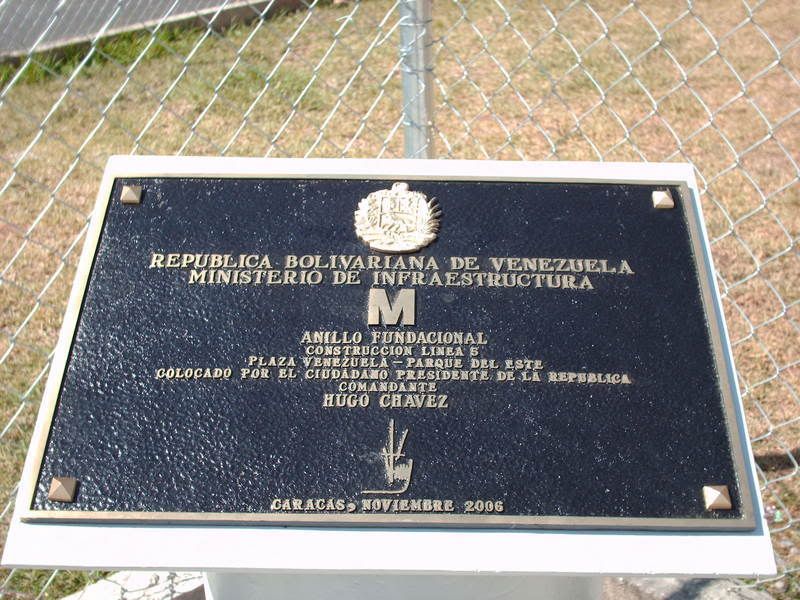
They also showed off the boaring machine being used to do the tunneling:
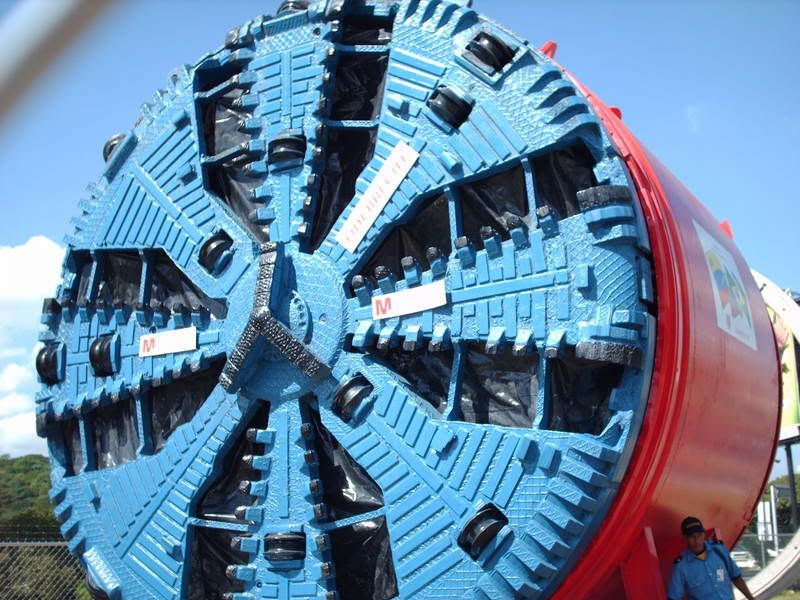
All this is good. But there is one little sneaky thing being done. The entire green line running parallel to the 1 line was always called the number 4 line. Now they have changed it and are calling the half they have already completed the number 4 line while designating the half they just started building as the number 5 line as can be seen from this new map:
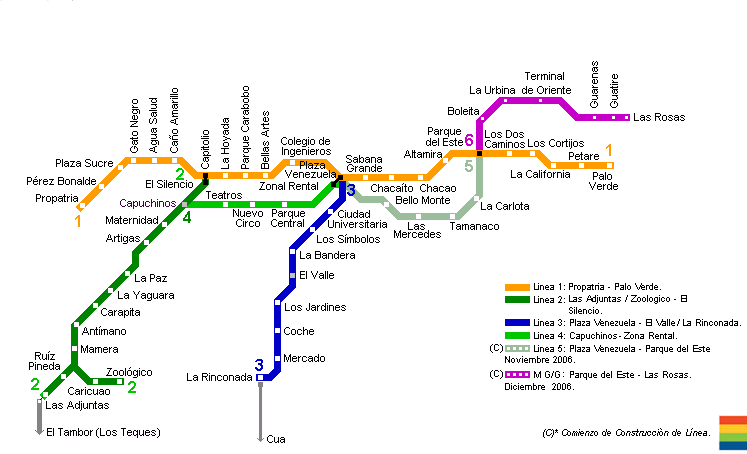
So now they when the construction is finished they can claim to have built two new lines, instead of just one. Of course, they really won't have built anything more than what was originally known as the number 4 line. Hopefully, soon they will build the true number 5 line, the purple line in the first map, and the number 6 line. Caracas needs new subway lines as soon as they can get them, not just old lines cut in half.
|

The interesting thing about how this is being built is that the steel spans are constructed on the southern side of the span and then are progressively pushed further our over the support towers. In other words, the beginning of the steel span which you see in the photo started on the Caracas side of the span but will ultimately wind up on the Vargas side of the viaduct. Pretty cool. I guess they do it that way because putting up big cranes all along the length of the bridge would be too much work and/or more costly.
On a related matter the government has also annonounced that it will build a new route down to the see from Caracas. From the following map you can see that it actually parallels the current route but then vears off through the mountains and has LOTS of bridges and tunnels.

I'm not exactly sure why they are doing this. The existing route is capable of handling the amount of traffic it has. I also know that building a rail link between Caracas and the sea has been mentioned. I think it would be a good idea to do that before building another expensive, and not clearly needed, road link.
UPDATE:
Since the subject of Caracas traffic and mass transit has come up in the comments I might as well do an update on the Caracas subway system which I've been meaning to do but haven't gotten around to.
First, here is a map from some time ago of what the Caracas subway is supposed to look like once it is fully completed:

Note the lines that are solid denote existing lines. The dashed lines are lines under construction or planned but not yet under construction. The main line is the orange number 1 line which goes from left to right across the middle of the map. It is far an away the most heavily used line, given that Caracas is in a valley that runds east to west, and is VERY overcrowded. The green line running south off the west end is the number 2 line and is heavily used but not overcrowded. The blue line running south in the middle is the number three line and note part of it is still under construction. It has been finished all the way to Rinconada as of a couple of months ago but not all the intermediate stations have yet been completed. There is also another planned line running south, in purple on the map, which is planned but not yet even under construction.
Due to overcrowding on the number 1 line the subway DESPERATELY needs parallel east-west lines to be built. Note there is a green dashed line running right beneath the number 1 line. The part on the left, from Capuchinos to Zona Rental, was opened a few months ago. The part to the right (east) of Zona Rental has now begun construction. Please note, this used to all be called the number 4 line but that has now changed.
Note this map shows one very interesting feature that I had never seen before, a yellow line running east-west due north of the number one line. If both the number 4 line and the yellow number 6 line are built that will be a BIG help.
Now, construction of the green line, from Zona Rental to Parque del Este was begun last month. Of course, Chavez showed up and place a plaque:

They also showed off the boaring machine being used to do the tunneling:

All this is good. But there is one little sneaky thing being done. The entire green line running parallel to the 1 line was always called the number 4 line. Now they have changed it and are calling the half they have already completed the number 4 line while designating the half they just started building as the number 5 line as can be seen from this new map:

So now they when the construction is finished they can claim to have built two new lines, instead of just one. Of course, they really won't have built anything more than what was originally known as the number 4 line. Hopefully, soon they will build the true number 5 line, the purple line in the first map, and the number 6 line. Caracas needs new subway lines as soon as they can get them, not just old lines cut in half.
|
